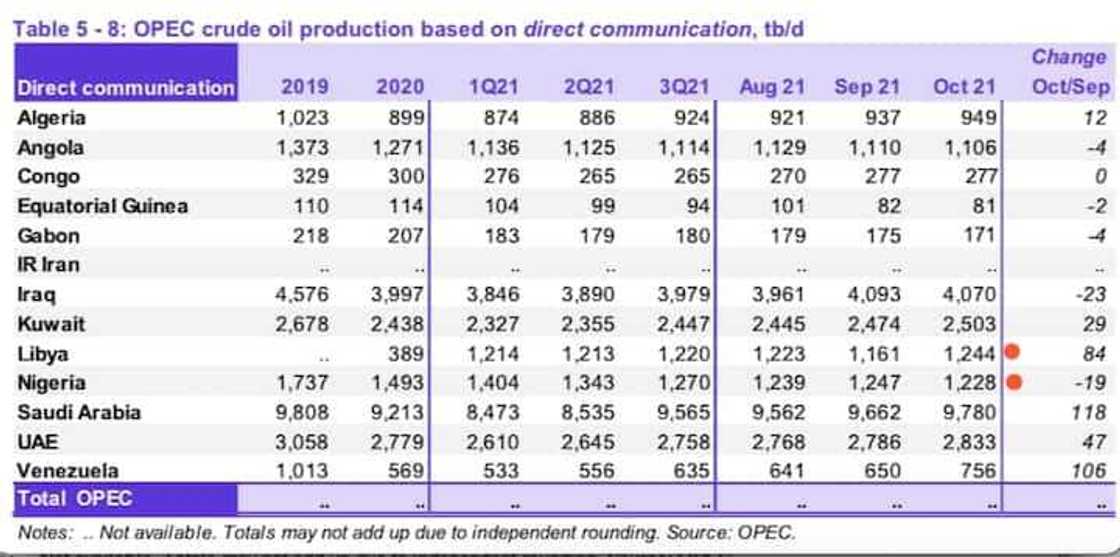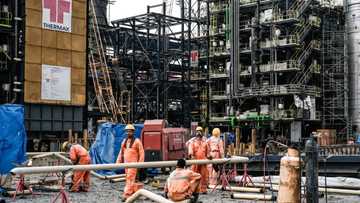Top International Oil Companies Ignore Nigeria, Take Investments to Libya, Now Africa's Largest Oil Producer
- Not only did Nigeria lose its status as Africa's leading oil producer to Libya, but it is now facing significant opposition for oil companies investments
- Top oil companies have expressed their desire to invest in Libya, barely months after the country ended its decade-long conflict
- Some international oil companies left in Nigeria are in fact leaving due to an increase in bunkering and vandalism of oil facilities
PAY ATTENTION: Click “See First” under the “Following” tab to see Legit.ng News on your Facebook News Feed!
Nigeria has not only lost its status as Africa's biggest oil producer to Libya, but some of the world's major oil firms heading to the North African country.
In a report by BusinessDay, France’s TotalEnergies SE and Italy’s Eni SpA are making plans to invest $2 billion into Libya’s Waha oil project, which will boost its production by about 100,000 barrels a day.
According to the report, the investment will increase production at one of Libya's largest oil fields, Mabruk.
It is also expected that the investment will be used to help build 500 megawatts of solar power to feed the country's local grid.

Source: Facebook
PAY ATTENTION: Join Legit.ng Telegram channel! Never miss important updates!
Nigeria losses top spot
Libya has the largest oil reserves in Africa, estimated at 43 billion barrels and 1 trillion cubic meters of natural gas, but security concerns over the years prevented the nation from reaching its full potential.
With the country's many fighting factions striking an agreement in 2020, oil output has increased once more.
Legit.ng had earlier reported that the Organization of Petroleum Exporting Countries (OPEC), in its October 2021 report, announced that Libya has overtaken Nigeria as Africa's largest oil producer after it produced 1.24 million barrels daily.
While the repot showed Nigeria produced 1.23 million barrels per day despite having the capacity to pump roughly 2.2 million daily.
Experts speak
Energy experts have continuously blamed insecurity challenges and ambiguity in government policies as the reason for the lack of investment in the oil sector.
In addition, the expert blamed old facilities and community workers’ protests, which incessantly disrupt operations as well as force majeure as the reason Nigeria's oil sector is struggling.
Gail Anderson, research director for sub-Saharan Africa at Upstream, believes that there are “not many” takers for the “high-cost, emissions-intensive assets” that are being disposed of by large oil producers in the Niger Delta.
He added:
The impact of this on the country’s foreign direct investment (FDI) will likely persist beyond 2021.
Also, Aurélien Mali, lead analyst for Africa at rating agency Moody’s, said:
"International oil companies have been “selling assets mostly in shallow waters” under a process “supported by the federal government to support local producers that were perceived as better able to deal with insecurity issues, in particular in the Niger Delta.”
Oil companies on the run
Not only Nigeria is struggling to attract investors, but those who over the years established their foothold in Nigeria are also leaving.
One of such is Global oil producer, Shell. Shell is among the big producers that recently kick-started a disinvestment drive from its oil assets in the Niger Delta.
Hard hit by the oil spills that have resulted in lawsuits from affected communities in and around the Niger Delta, and insecurity that has culminated in pipeline sabotages.
Reports have it that Shell is currently in talks with the government to divest all of its operated joint venture (JV) licences held by its subsidiary Shell Petroleum Development Company (SPDC), including a 30% interest in 19 oil and mining leases (OMLs).
Another is Total Nigeria which, in January 2021, announced it completed the divestment of its interest in onshore Oil Mining Lease (OML) 17 to the Nigerian company TNOG Oil & Gas.
Total operated under a joint venture partnership with Shell and Italian firm Agip Oil Company in the OML 17 — both of which are also disinvesting from the project.
A ray of hope
Despite the challenges at the recently concluded Intra-African Trade Fair (IATF) in Durban, South Africa, the Nigerian National Petroleum Corporation (NNPC) signed a five-year deal worth $1.04 billion(N427,8bn) with the African Export-Import Bank (Afreximbank).
The deal meant for trade financing is for the export of the crude produced by the NNPC, and the repayment process would be through crude supply to the bank.
The deal is more like collecting money in advance to supply about 25,000 barrels per day of crude oil produced.
Only time will tell how the deal will help Nigeria's struggling oil sector.
Eyebrows raised on govt plans to increase pressure on its finances
Legit.ng in an earlier report revealed that the federal government has announced the payment of N5,000 as a transport grant after the removal of the fuel subsidy.
Nigeria's minister of finance, Zainab Ahmed, on Tuesday, November 23, revealed that beneficiaries would be Nigerians who make up the poorest population.
According to the minister, FG hopes to do this before June 2022 in line with the Petroleum Industry Act (PIA).
Source: Legit.ng






